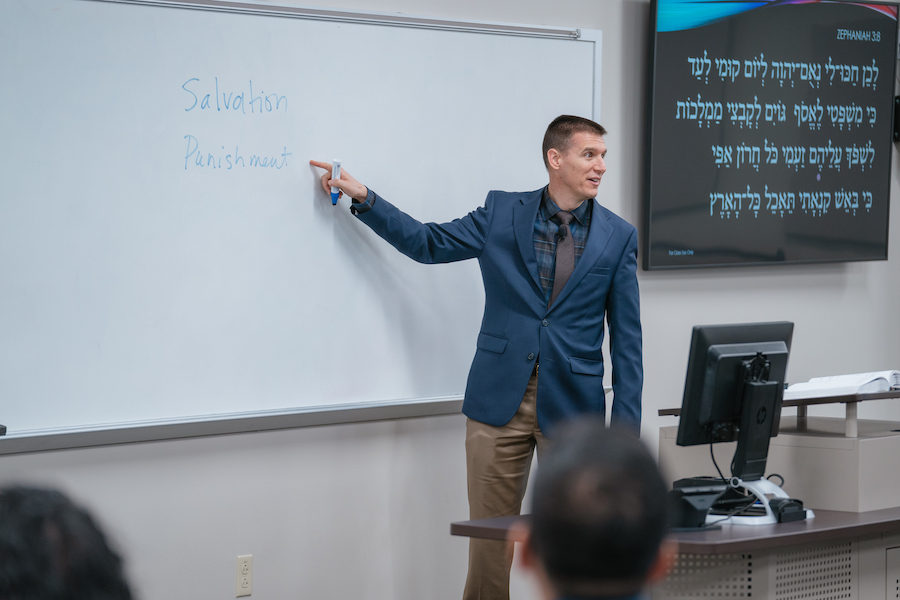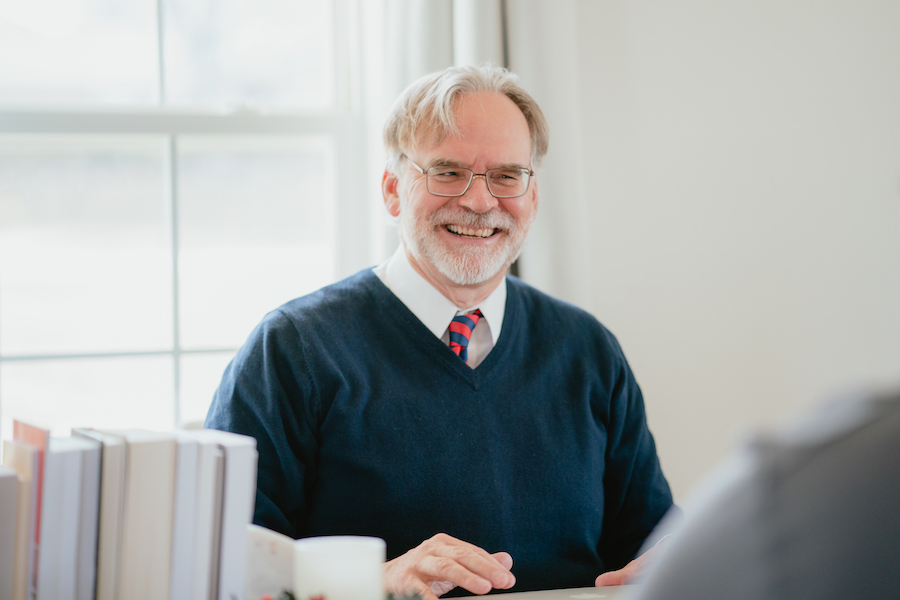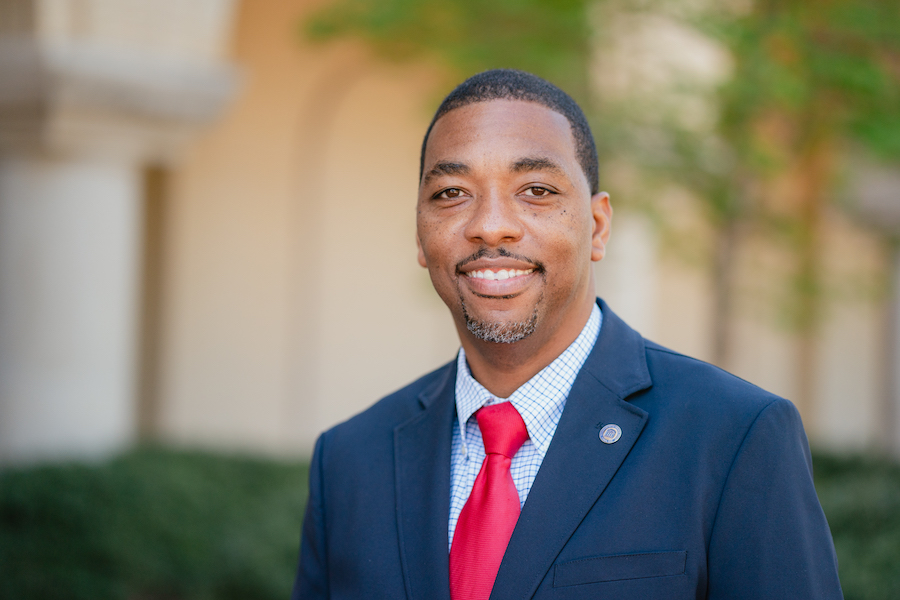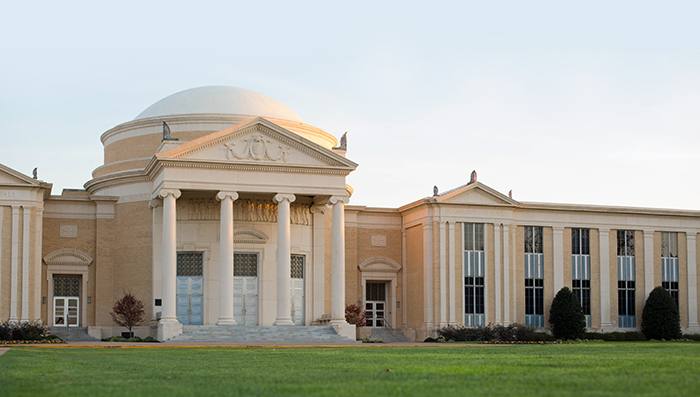Shirley teaches, models disciple-making among students
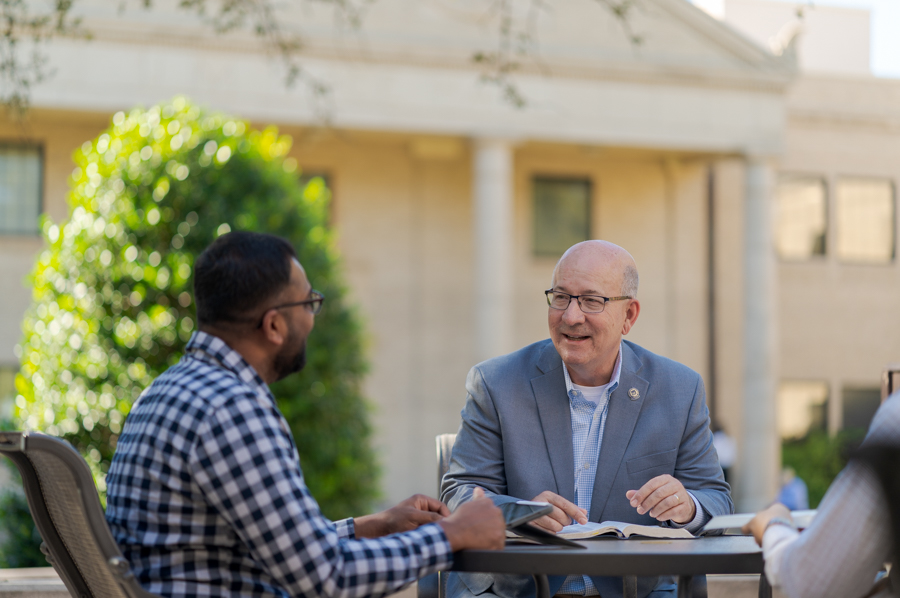
In the spring of 2016, when South Korean native Sungwan Kim was working towards his Master of Arts in Christian Education at Southwestern Baptist Theological Seminary, he “had a lot of questions” that he sent to the professor of his Ministry of Education course. One Friday afternoon, the professor, Chris Shirley, “spent two hours answering” all of Kim’s questions and continued to meet with him throughout the semester during office hours and over lunch, and encouraged him to “study, graduate, and glorify God.”
For the last three years, Kim, who will graduate in December with a Doctor of Philosophy in foundations of education, has served as the Teaching Assistant (TA) to Shirley, who was named the eighth dean of the century-old Jack D. Terry School of Educational Ministries at Southwestern Seminary in October. While Shirley, who is also professor of educational ministries and occupies the Jack D. and Barbara Terry Chair of Religious Education, teaches discipleship in his classes, he also models disciple-making among his students.
“Dr. Shirley has helped me grow in my walk with Christ by being open to meeting with me and intentionally engaging in meaningful conversations with me on campus,” said Zachary South, a Master of Divinity student with a concentration in family and student ministry who will also graduate in December. “He has been a Christ-like example in the way he teaches, prays, and applies the Scripture to our lives.”
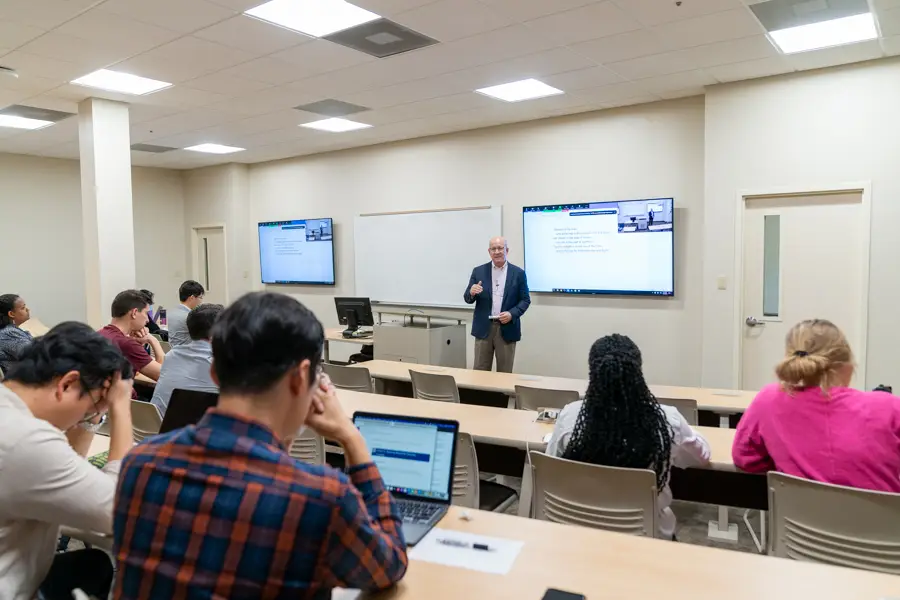
Chris Shirley, dean of the Jack D. Terry School of Educational Ministries, teaches, and models disciple-making for Southwestern students.
South, a native of Jasper, Texas, said God has used Shirley “not only to equip me with strategies for discipleship and teaching but also to grow” his “passion and desire for the two in the local church.”
Shirley’s desire for discipleship began as he was serving as the associate director of Ridgecrest Camps at Ridgecrest Conference Center in the Blue Ridge Mountains of western North Carolina. After earning a Bachelor of Business Administration degree with a music business minor, the West Palm Beach, Florida, native began serving as a staffer at the same camp he attended as a high school student.
During the seven years he served in the role, Shirley said he found while he was ministering to the kids who attended the camp he also “really enjoyed ministering to the staff and I loved equipping them and discipling them and helping them to grow in what they were doing with our camps, but also to grow in their walk with the Lord as well.”
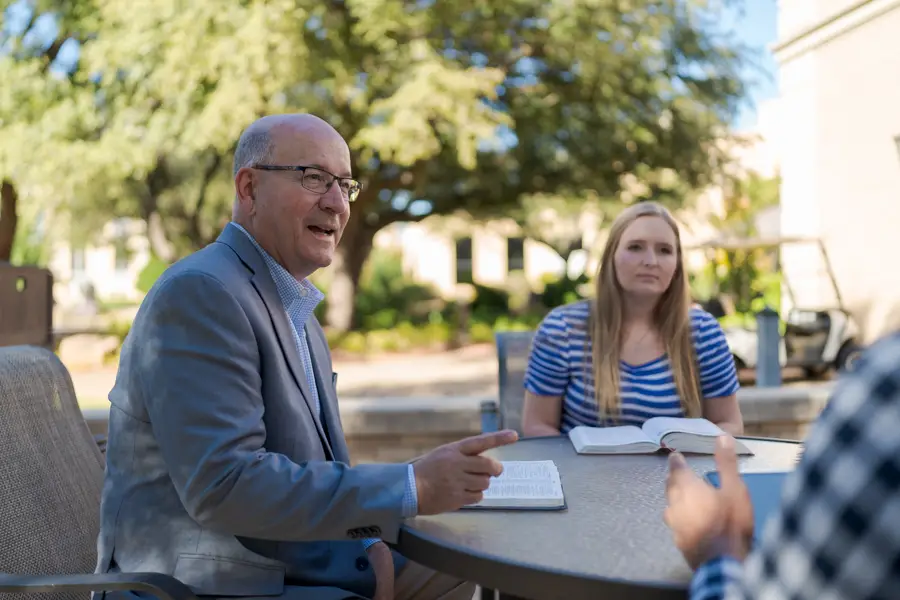
After ministering to students at camp, Chris Shirley realized his calling from God.
Simultaneously, the pastor at Shirley’s church, First Baptist Church of Black Mountain, North Carolina, began to “mentor” him. Shirley became a deacon, a teacher at the church, and a church committee leader. Shirley remembered that he “really like doing these things” and loved being a part of the church, “the inner workings,” and leading ministry. As God was preparing him “internally,” and others were affirming giftedness for teaching and ministry, “God began to shift me and my direction and my vision for my life and what He had for me to do,” Shirley explained.
“I love to teach in the church,” Shirley said. “I began to see all these areas of interest that I had in not just developing disciple-making relationships, but also equipping others to make disciples and teaching God’s Word to people and being involved in ministry, but also help getting them involved.”
The Lord’s redirection led Shirley to Texas to begin studying at Southwestern Seminary. He said he selected the Fort Worth-based institution after research showed him one of the “primary areas of expertise here was in the area of education.” As a student earning a Master of Arts in Religious Education in the 1990s, Shirley was influenced by Southwestern professors who were teaching in the field of foundations of education, including Norma Hedin, who currently serves as provost at Dallas Baptist University; Scott Floyd, director of counseling ministries at Gambrell Street Baptist Church in Fort Worth; and Rick Yount, retired professor of foundations of education.
“All of them kind of had their different personalities and different quirks and strengths and weaknesses, but they all contributed in some way to shape me into what I became,” Shirley recalled.
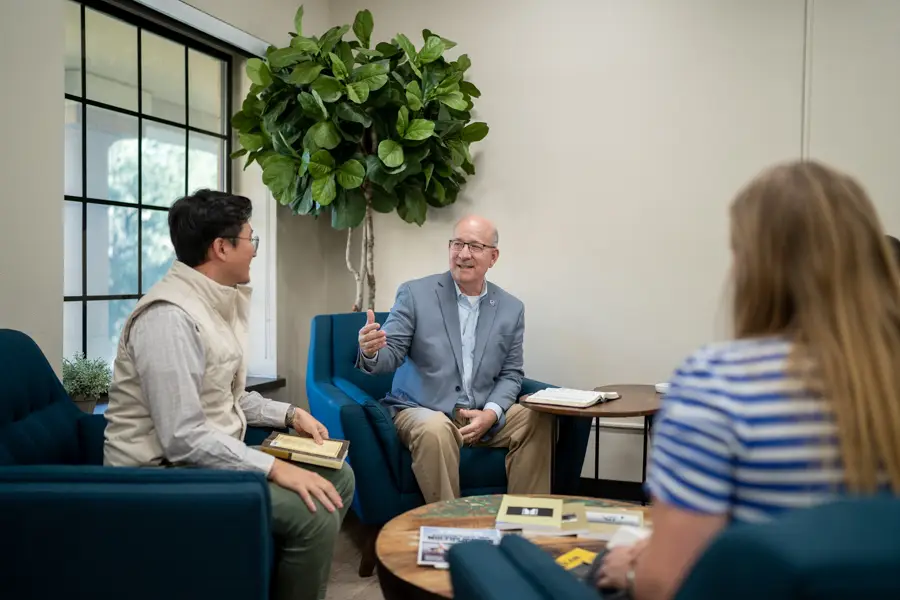
Chris Shirley “loves to teach” in the church and prepare ministers in seminary.
The time following his 1994 graduation with a MARE from Southwestern was “foundational” and “formational” as Shirley said he began learning his interests and skills.
“The very thing that I just really loved to do was to kind of be on the ground level building relationships with people in the church, teaching the Word of God, [and] walking people through the growth process in Christ,” Shirley remembered. He said he saw all the areas “coalesce” and form a “direction for ministry” for him “to be a spiritual growth change agent in the church.” Shirley said this led him to become “more and more interested in being a part of that process and seeing that happen within the church at all levels, at all ages.”
As he began working on his Doctor of Philosophy in foundations of education and teaching as an adjunct professor at Southwestern, Shirley also began serving as associate pastor at Wedgwood Baptist Church in Fort Worth where he helped “develop a model there for a ministry in which we were looking at disciple-making from a holistic standpoint.” He worked with the church’s staff, leaders, and teachers to “develop pathways for making disciples in every age group at every stage of life.”
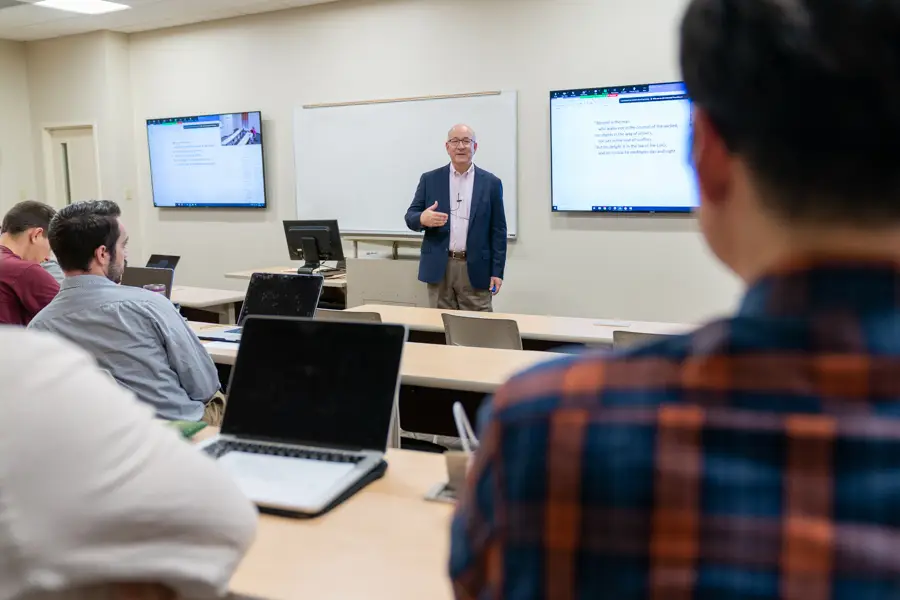
Chris Shirley aims to help ministers and church goers reach every age group of their church community.
They are the same lessons he teaches his students in the classroom today. In 2007, five years after he earned his doctoral degree, Shirley began as an associate professor of foundations of education at Southwestern Seminary. He taught in the role until 2016 when he moved to DBU to serve as the program director for the Master of Arts in Discipleship degree program. When he returned to Southwestern in 2019 it was as the associate dean of the Terry School and professor of educational ministries.
“I have learned in his classes strategies for implementing effective discipleship and teaching plans, with the goal of growing and making disciples of Jesus Christ,” South said. “He has most noticeably and practically taught me how to write lesson plans that are much more effective not only for me as a Bible teacher but also for others to follow along with in teaching the Bible.”
Joshua Park, a Master of Divinity student with a concentration in biblical counseling from Monterey, California, shared similar experiences under Shirley’s teaching.
“I have learned both spiritual disciplines in his Spiritual Formation course, and how to provide discipleship,” Park said, as he explained that Shirley has “opened my horizon on what it truly means to be a disciple of Christ and how to provide/serve those God has allowed me to lead.”
Park added that Shirley has “taught me to be humble before God and the importance of being thankful for God’s grace and mercy.”
Shirley’s teaching also led Grace Kim, a current Doctor of Philosophy student from Busan, South Korea, who earned a Master of Arts in Christian Education at Southwestern in 2020, to learn that “as believers, we are called to be Jesus’ disciples who would disciple other people.”
“When we are saved, we are called to become followers of Christ, who would actively evangelize unbelievers and disciple other believers so that this world will be filled with His disciples,” Kim said. “His emphasis on discipleship has shaped my life’s purpose, paradigm, and goal because I know what I am called to do on earth.”
As Shirley teaches his students inside and outside of the classroom, he reminds them during the last class at the conclusion of each semester “our class is not over yet; it’s just begun.”
“When you leave this place, I want you to still consider me your teacher,” he said he tells the students during the final class meeting time. “Know that I’m here to help you and to guide you and to invest in your ministry and to be a part of your ministry in whatever way would be helpful to you and would add value to your church and your ministry. So, please, bother me and consider this an invitation to more class in the years to come.”
